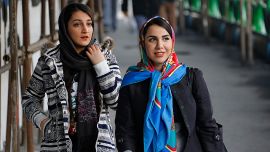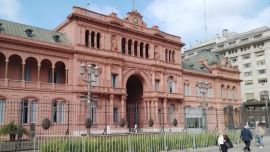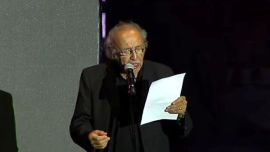Argentina’s foreign policy is a mess. It is because – like President Alberto Fernández’s approach to legal matters and a great many other things – it has to fit in with Cristina Fernández de Kirchner’s overriding objective, which is to thwart the many who want to see her behind bars for acquiring a huge amount of money by unacceptable means.
Were it not for the all too plausible corruption charges that are hanging over the lady who tells Alberto what he can and can’t do, Argentina could, notwithstanding her economic eccentricities, be a fairly “normal” country on good terms with the United States and Western Europe. What is more, Cristina’s habit of pocketing any banknotes that come within reach also means there is no chance of the country facing the fast approaching economic firestorm under a national unity government; members of the opposition coalition can hardly be expected to pretend they believe that the vice-president has always been a model of civic virtue and should be allowed to get away scot-free.
It is entirely due to Cristina’s troubles with the law that foreign policy has been left in the hands of her devoted followers, who include a clique of anti-Western extremists with jihadist sympathies. As a result, the Kirchnerite government goes out of its way to curry favour with the regimes not just of Venezuela, Nicaragua, Cuba, Russia and China, which it apparently sees as ideological kinfolk, but also the Islamic Republic of Iran. Unlike their counterparts in democratic countries, the rulers of autocracies think rampant corruption is tolerable if those on the take happen to be useful to them. Being predators at heart, they like doing business with politicians who are either corrupt themselves or are soft on corruption because it is easy to blackmail them. They certainly do not go in for the relentless moralising that is typical of US office-holders and, up to a point, their European equivalents.
Cristina’s decision, backed dutifully by Alberto, to move Argentina closer to the Latin American dictatorships that are challenging the international status quo and get on well with the bigger examples of the breed in Russia and Asia which are doing their best to get footholds in the region, has come at an awkward moment. In the hope of recouping some of what he lost by pulling out of Afghanistan almost overnight, US President Joe Biden is trying to build a coherent democratic alliance to put the tyrants in their place. For his part, Alberto desperately wants the United States to help him get the International Monetary Fund to accept that it would be utter folly to demand that he slash public spending merely because the country has run out of money and is getting blackballed by creditors. This is something Washington is reluctant to do – while it may be assumed that Biden has no desire to see Argentina go under during his watch, neither he nor other members of his team are willing to back economic policies they think are idiotic or, for that matter, turn a blind eye to Kirchnerite attacks on judges Alberto says are useless, presumably because he suspects they disapprove of corruption.
At first sight, the people currently calling the shots in Argentina do not seem to have that much in common with the genocidal Iranian clerics who are hell-bent on wiping out the Israelis and whoever else is in the vicinity when great day arrives, as well as hitting the “Great Satan” (otherwise known as the United States) so hard it will lie squirming in the dust for many years to come, which is something the man now in charge of the bloodthirsty Islamic Revolutionary Guards says could be about to happen.
While Alberto may have stuffed his head with loopy ideas in an attempt to convince Cristina and her followers that deep down he is really one of them, few see him as a fanatical enemy of the increasingly shaky international order, if only because he does not seem to know much about what is going on outside the part of the world he lives in. The same cannot be said about Cristina who, influenced less by the late Venezuelan demagogue Hugo Chávez than by the uncomfortable feeling that her behaviour when in office was making her a persona non grata in the Western world, decided it would be a good idea to cosy up to the ayatollahs as many of her dodgy friends in other Latin American countries were doing.
This, presumably is why Foreign Minister Santiago Cafiero let Argentina’s ambassador to Nicaragua attend the latest swearing-in of Nicaragua’s despicable president Daniel Ortega alongside Mohsen Rezai, the former head of the Iranian Revolutionary Guard who is now the Islamic Republic’s “vice-president for economic affairs” and is high on the wanted list for his role in the attack on the AMIA Jewish community centre building in July 1994 in which 85 people died and hundreds were injured, making it the worst terrorist atrocity in the country’s history?
By almost any standards, it was an act of war but, needless to say, Argentina lacked the military resources to retaliate with force. Had that not been the case, the Iranians would have thought twice before getting involved, but they knew that Argentina would be left with no alternative but to rely on international law. With the cooperation of countries which make a show of respecting it, she did manage to make life more uncomfortable for a number of top Iranians until, to widespread bewilderment, Cristina decided it would be in her interest to in effect drop the charges. Nonetheless, they are still valid and had the Foreign Ministry wanted, it could at least have asked Nicaragua to handcuff Rezai and send him south to stand trial, something which, given the leisurely pace of Argentine judicial proceedings, would have meant holding him here for a very long period.
Though Ambassador Daniel Capitanich may have been unaware that the individual he was going to hobnob with was wanted for the mass murder of Argentines, other government officials must have known all about Rezai but they did not think of warning their man in Managua, presumably for fear of upsetting Ortega, the Iranians and, of course, Venezuela’s unlovely dictator Nicolás Maduro, who also attended the gathering. It would seem that, as far as the Kirchnerite government is concerned, it is far more important to keep on speaking terms with such individuals than to make an effort to bring those responsible for the AMIA bombing to book.



















Comments